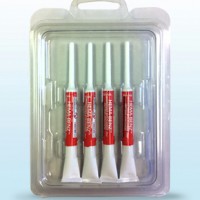 When you take a drink of a cold beverage, or bite down on an ice creamy bar, or slurp some hot soup does the stinging sensation in your teeth make you cringe in pain?
When you take a drink of a cold beverage, or bite down on an ice creamy bar, or slurp some hot soup does the stinging sensation in your teeth make you cringe in pain?
If so, then you’ve got “sensitive teeth,” a simple name for what can be an uncomfortable and painful condition.
So what’s happening to create this condition? Why do your teeth react to hot, cold, sweet, or sour, and sometimes even to pressure the way that they do? The reasons could be many as to what’s causing your discomfort.,
Teeth can become sensitive for many different reasons, from tooth and gum trauma to dental disease, which can destroy tooth pulp, requiring a root-canal procedure to relieve the pain.
Often, teeth feel sensitive after they’ve been cleaned, filled, or otherwise worked on at the dentist’s office, and the most common cause is After Tooth Whitening procedures, either at the Dentists or from the many over the counter products you can buy at the store. These kinds of sensitivity can take weeks or even months, if ever to go away.
In other situations, people can cause tooth sensitivity by habitually grinding their teeth or clamping their jaws tightly shut. This type of sensitivity to pressure isn’t something to worry about if it happens once or twice and goes away in a day or two. The teeth just need some time to recover from the trauma. It’s when the sensitivity is persistent that you should suspect something else like a cracked, broken or decayed tooth you should see your dentist.
Tooth Sensitivity to temperature usually happens when teeth have been compromised in some way, By far the most common cause of tooth sensitivity to temperature and sweet or sour foods is when the dentin is exposed. Dentin is the tissue beneath the tooth’s enamel surface that contains microscopic nerve fibers. Dentin can become exposed in different ways, like tooth decay, toothbrush abrasion aggressive brushing, or gum recession. Regardless of the cause, exposed nerves make the teeth very sensitive.
If you experience sensitivity in one or more of your teeth, there are treatments that can help stop the sensitivity. Tooth Desensitizers like Hema-Benz have been used by Dentists for years and are now available on-line for direct purchase. Simple apply the Desensitizer to the sensitive teeth and the pain is gone in seconds. Hema-Benz seals the tooth’s exposed Dentin to reduce or eliminate the discomfort fast.
Another solution is try desensitizing toothpaste. Unfortunately, toothpastes don’t work very well to seal the tooth like Hema-Benz due to enamel abrasion or gum-line recession While these toothpastes are better than nothing they take a long time of daily use to work at all. The active ingredients in Hema-Benz Tooth Desensitizer with Fluoride stops the sensitivity by filling channels (known as tubules) in the dentin and seals off the dentin, and it only takes one application and less than 30 seconds.
For short term immediate relief you could put some toothpaste on your finger or on a cotton swab and spreading it over the sensitive areas before you go to bed, don’t rinse it out after wards your teeth should begin to feel less sensitive for the night.
Fluoride rinses are another way to diminish sensitivity for the short term and can be found in the grocery store, Use it once a day. Swish it around in your mouth, than spit it out.
Switch to a soft toothbrush. Often, people actually cause tooth sensitivity by brushing with too much force and/or brushing with a hard-bristled brush, which can damage the protective tooth enamel. When the gum-line recedes (often as a natural part of the aging process), exposed dentin becomes even more vulnerable to toothbrush abrasion. Use a brush with the softest bristles you can find, and apply only a small amount of pressure when brushing (actually, a lighter touch also allows the bristles to move more freely and do their job more effectively than when you press too hard).
Finally, keep your teeth clean. Plaque, the white gummy substance that forms on teeth, produces an acid that irritates teeth, especially if your choppers are naturally sensitive. Wage a daily attack against plaque by brushing at least twice, preferably right after eating and especially before bed, and flossing at least once.
When to See a Doctor About Tooth Sensitivity
While you can often self-treat generalized tooth sensitivity, see your dentist if:
- Your teeth are persistently sensitive to pressure.
- A single tooth is persistently sensitive,
- Sensitivity doesn’t decrease after two weeks of using Hema-Benz tooth desensitizer
- Desensitizing toothpaste aren’t working
- You have dental pain that lasts more than an hour.
- Gums around a sensitive tooth change color.
- You have any obvious decay.

